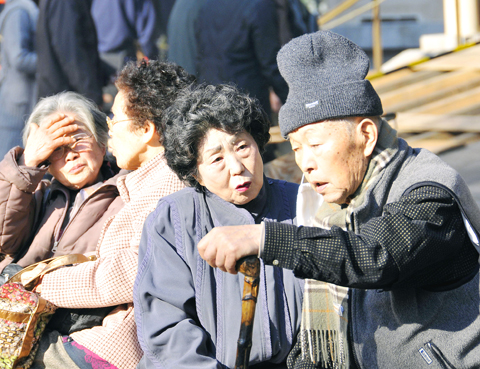Boisterous weekend crowds flock to Tokyo’s Sugamo district where, unlike areas popular with hip young things, shoppers are gray-haired, short-sighted and often hard of hearing.
As Japan’s population ages, retailers in this northern suburb of the capital are focusing on the interests and needs of the elderly.
The shops lining the main street in Sugamo are benefiting from the rapid graying of Japan, where one in five of the country’s 127 million people is 65 or older.

PHOTO: AFP
And that market will keep growing as the baby-boom generation enters its 60s.
Haruko Sugisawa, working at the Sugamoen bakery, tells customers the pastries are all healthy.
“Our cakes don’t have any chemicals and little sugar,” she said.
Nearby the tiny Tokiwa Shokudo restaurant boasting “homemade” food is doing a roaring trade as manager Yuki Saito says: “Our customers are almost always older men who are alone.”
Sugamo’s main commercial attraction is its clothing stores, a must-visit for elderly women who come for the area’s signature fashion statement — rose red underwear.
In the Asian medical tradition, red undergarments help heat the body. And while some may doubt there is more than a psychological effect, red undergarments have become a top gift for Japanese in their 60s.
“For the past 15 years, our old lady customers have been asking us for red things,” said Hideji Kudo, who runs the Maruji clothing store.
The store offers a complete collection of clothing in the same red — from lingerie to trousers and even hats.
“People in their 80s buy apparel that’s obviously for elderly people. But people in their 60s want clothes that make them look young — and those are more difficult to design,” Kudo said.
He said that newly retired people who are still in good health, and suddenly have plenty of free time, will sometimes travel up to 100km to shop at his store.
The initial draw to the neighborhood is the Kogan-ji temple, which boasts a statue of the folk deity Togenuki — said to cure the ills of anyone who gives it a scrub.
“I have pain in the spine, so I want to find relief by washing Togenuki,” said Shizuko, a woman in her 70s from Yokohama.
While ill people have flocked to the temple since the aftermath of World War II, Sugamo began to grow in popularity 30 years ago when a newspaper baptized it “Harajuku for Grannies” — an old people’s version of the youth fashion area.
“Since then, more and more elderly people have been coming here,” said Shigeru Yamanaka, 82, who owns the neighborhood’s Suzukiya shoe store.
The crowds are particularly big on the fourth, 14th and 24th of each month, numbers regarded as auspicious.
The seniors go there alone, with friends or with lovers.
According to urban legend, Sugamo is also a hot spot for elderly sexual encounters with the pay-by-the-hour love hotels doing brisk business.

IDENTITY: A sex extortion scandal involving Thai monks has deeply shaken public trust in the clergy, with 11 monks implicated in financial misconduct Reverence for the saffron-robed Buddhist monkhood is deeply woven into Thai society, but a sex extortion scandal has besmirched the clergy and left the devout questioning their faith. Thai police this week arrested a woman accused of bedding at least 11 monks in breach of their vows of celibacy, before blackmailing them with thousands of secretly taken photos of their trysts. The monks are said to have paid nearly US$12 million, funneled out of their monasteries, funded by donations from laypeople hoping to increase their merit and prospects for reincarnation. The scandal provoked outrage over hypocrisy in the monkhood, concern that their status

The United States Federal Communications Commission said on Wednesday it plans to adopt rules to bar companies from connecting undersea submarine communication cables to the US that include Chinese technology or equipment. “We have seen submarine cable infrastructure threatened in recent years by foreign adversaries, like China,” FCC Chair Brendan Carr said in a statement. “We are therefore taking action here to guard our submarine cables against foreign adversary ownership, and access as well as cyber and physical threats.” The United States has for years expressed concerns about China’s role in handling network traffic and the potential for espionage. The U.S. has

A disillusioned Japanese electorate feeling the economic pinch goes to the polls today, as a right-wing party promoting a “Japanese first” agenda gains popularity, with fears over foreigners becoming a major election issue. Birthed on YouTube during the COVID-19 pandemic, spreading conspiracy theories about vaccinations and a cabal of global elites, the Sanseito Party has widened its appeal ahead of today’s upper house vote — railing against immigration and dragging rhetoric that was once confined to Japan’s political fringes into the mainstream. Polls show the party might only secure 10 to 15 of the 125 seats up for grabs, but it is

The US Department of Education on Tuesday said it opened a foreign funding investigation into the University of Michigan (UM) while alleging it found “inaccurate and incomplete disclosures” in a review of the university’s foreign reports, after two Chinese scientists linked to the school were separately charged with smuggling biological materials into the US. As part of the investigation, the department asked the university to share, within 30 days, tax records related to foreign funding, a list of foreign gifts, grants and contracts with any foreign source, and other documents, the department said in a statement and in a letter to